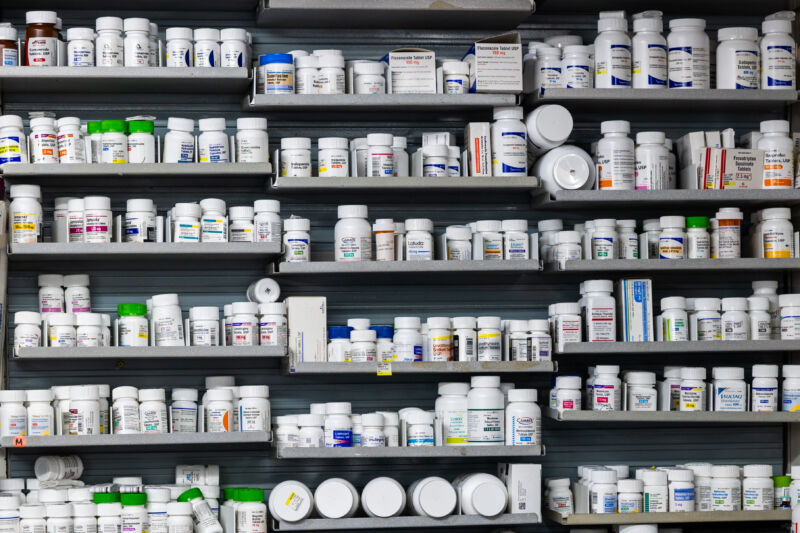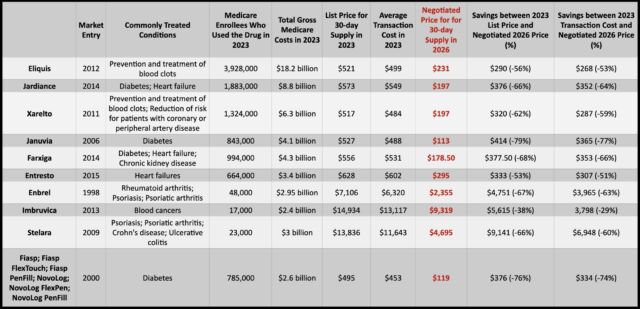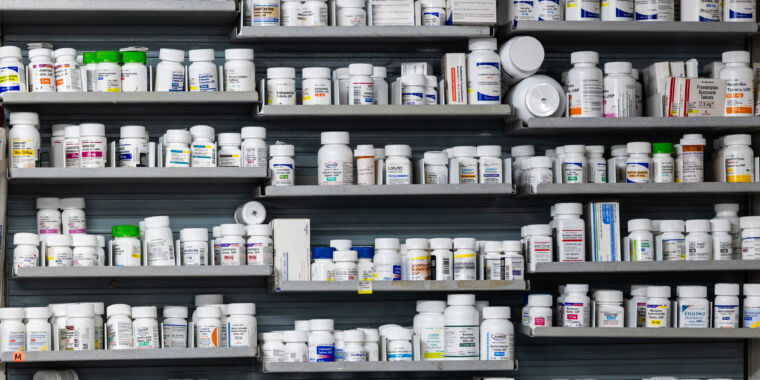
In the first round of direct price negotiations between Medicare and drugmakers, prices for 10 high-priced and commonly used drugs saw price cuts of between 38 percent and 79 percent compared to their 2023 list prices, the White House and the U.S. Department of Health and Human Services (HHS) announced Thursday. The new negotiated prices will go into effect on Jan. 1, 2026.
The 10 drugs under negotiation are used to treat a range of conditions, from diabetes, psoriasis, blood clots, heart failure and chronic kidney disease to blood cancers. About 9 million people with Medicare take at least one of the drugs on the list. In 2023, the 10 drugs accounted for $56.2 billion in total Medicare spending, or about 20 percent of total gross spending through Medicare Part D prescription drug coverage. But in 2018, spending on the 10 drugs was only about $20 billion, rising to $46 billion in 2022 — a 134 percent increase. In 2022, Medicare enrollees will collectively pay $3.4 billion in out-of-pocket costs for the drugs.

It’s unclear how much the newly negotiated prices will actually save Medicare beneficiaries in 2026. The total cost and co-pays will depend on each member’s coverage plans and other drug expenses. In addition, the co-pay cost for Medicare Part D beneficiaries will be capped at $2,000 in 2025, which alone could significantly reduce costs for some beneficiaries before the negotiated prices take effect.
If the newly negotiated prices were to take effect in 2023, HHS estimates it would save Medicare $6 billion. HHS also estimates the prices would save Medicare enrollees $1.5 billion in out-of-pocket costs in 2026.
The price negotiations have been ongoing since August of last year, when HHS announced the first 10 drugs it would put up for negotiation. Medicare said it has held three meetings with each of the drugmakers since then. For five of the drugs, the offer-and-counteroffer process resulted in an agreed-upon price, with Medicare accepting revised counteroffers from drugmakers for four of the drugs. For the other five drugs, Medicare made final written offers on prices that were ultimately accepted. If a drugmaker had rejected the offer, it would have had to either pay high prices or pull its drug from Medicare plans.
“The negotiations were extensive. They were intense. It took both sides to get a good deal,” HHS Secretary Xavier Becerra told reporters Wednesday night.
“Pricing regulation”
Both the price negotiations and the $2,000 cap are provisions of the Inflation Reduction Act (IRA), which was signed into law by President Biden in 2022. In a statement Thursday, Biden noted that Vice President Kamala Harris cast the deciding vote to pass the legislation along party lines and that they are both committed to fighting Big Pharma.[T]“The vice president and I are not giving up,” Biden said. “We will continue the fight to ensure all Americans pay less for prescription drugs and to give American families more breathing room.”
“Today’s announcement will be life-changing for so many of our loved ones across the country,” Harris said in her own statement, “and we’re not stopping here.” She noted that the list of drugs eligible for Medicare negotiation will grow each year, with another 15 drugs added by 2025.
In a scathing response to the negotiated prices, Steve Ubl, president of the industry group Pharmaceutical Research and Manufacturers of America (PhRMA), called the negotiations a “price-setting scheme” and warned that patients would be disappointed. “There are no guarantees that patients will see lower co-payments because the [IRA] has done nothing to curb abuses by insurance companies and PBMs, who ultimately determine which drugs are covered and what patients pay at the pharmacy,” Ubl said. He went on to warn that IRA “fundamentally changes” the incentives for drug development and will result in fewer drugs being developed to treat cancer and many other conditions.
In a December 2023 report, the Congressional Budget Office estimated that “13 fewer new drugs (out of an estimated 1,300 new drugs) will come to market over the next 30 years as a result of the law.”
The pharmaceutical industry has launched a series of legal challenges to the negotiations, claiming they are unconstitutional, and has so far lost every ruling.

